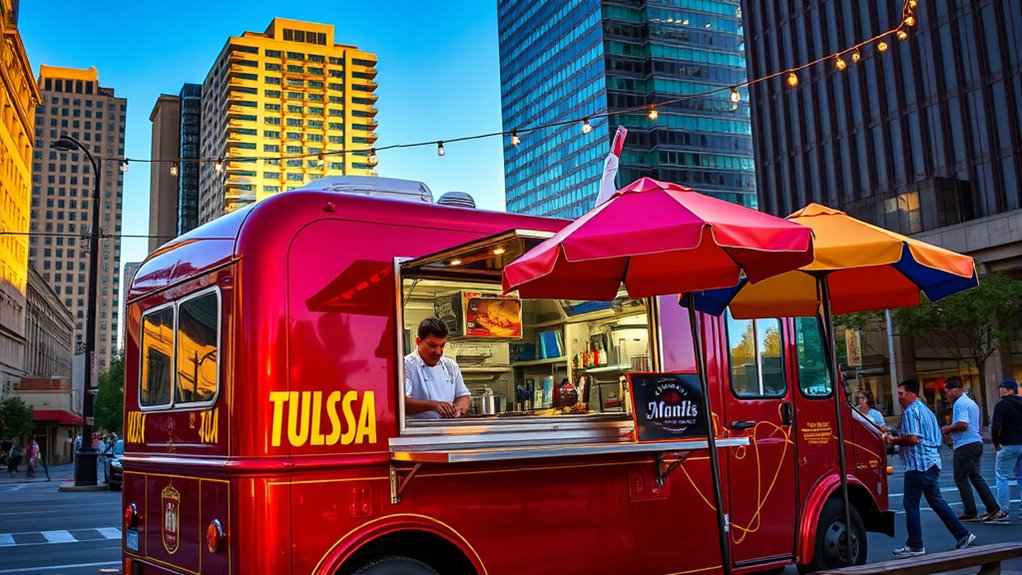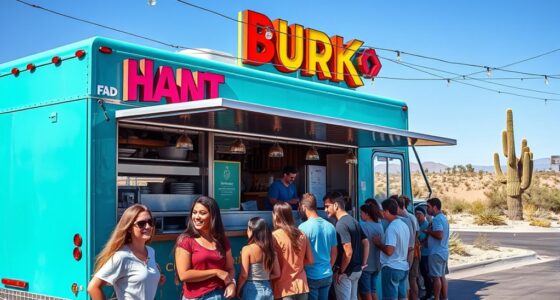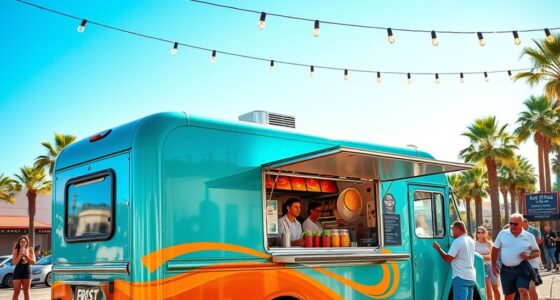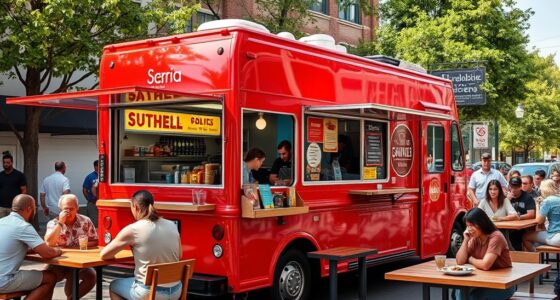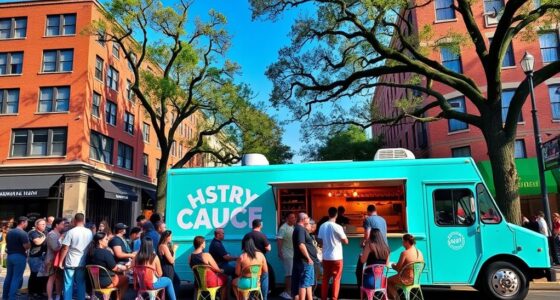To start a food truck in Tulsa, OK, you need to follow local regulations by applying for permits and sanitation licenses online. Focus on well-maintained equipment, eye-catching branding, and a creative menu that appeals to your target crowd. Budget for vehicle customization, safety features, and marketing tools like social media and contactless payments. Joining the vibrant Tulsa food truck community and selecting high-traffic event spots can boost your success. Continue exploring to learn how to make your food truck venture thrive.
Key Takeaways
- Complete online permit and sanitation documentation to operate legally in Tulsa.
- Budget for vehicle customization, signage, kitchen equipment, and safety features to ensure compliance and branding.
- Prioritize regular maintenance and equipment checks to prevent breakdowns and ensure reliable service.
- Choose high-traffic event locations and festivals to maximize visibility and customer engagement.
- Leverage social media and community involvement to build loyalty and establish a strong local presence.
Food Truck Trend Resurgence
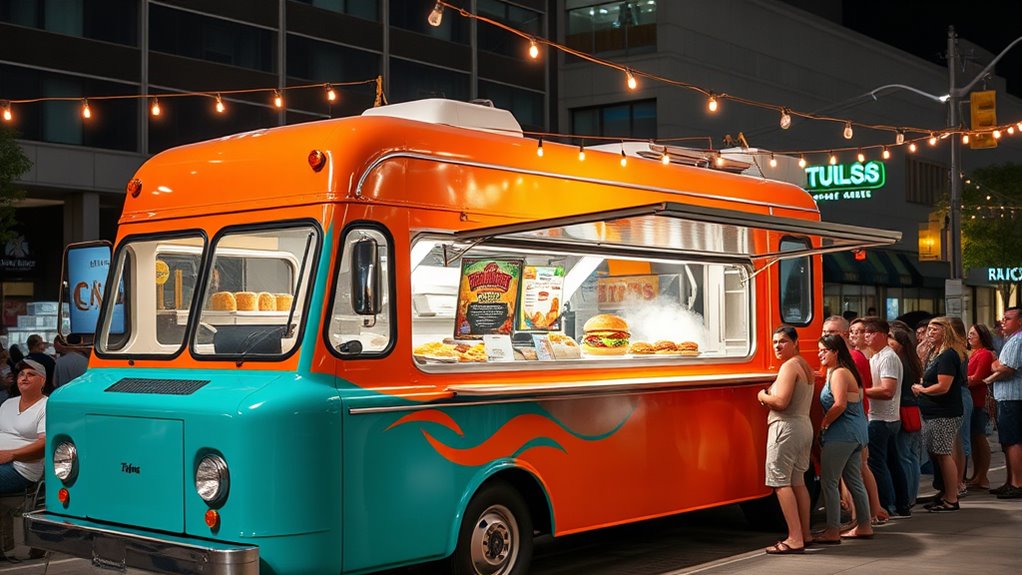
The food truck trend is making a strong comeback in Tulsa, driven by both entrepreneurs and diners seeking fresh, diverse options. To succeed, you need to prioritize food truck maintenance, ensuring your vehicle stays reliable and efficient. Regular checks on equipment, engines, and cleanliness prevent costly breakdowns and keep customers satisfied. Additionally, mobile app integration has become essential for attracting more patrons. By enabling customers to place orders, browse menus, and pay seamlessly through apps, you enhance convenience and boost sales. Staying updated with the latest technology and maintenance routines allows you to stand out in Tulsa’s competitive market. Embracing these strategies helps you build a strong reputation and capitalize on the resurgence of the food truck scene in the city. Incorporating smart design principles into your setup can also create a more comfortable and welcoming environment for customers.
Understanding Local Requirements
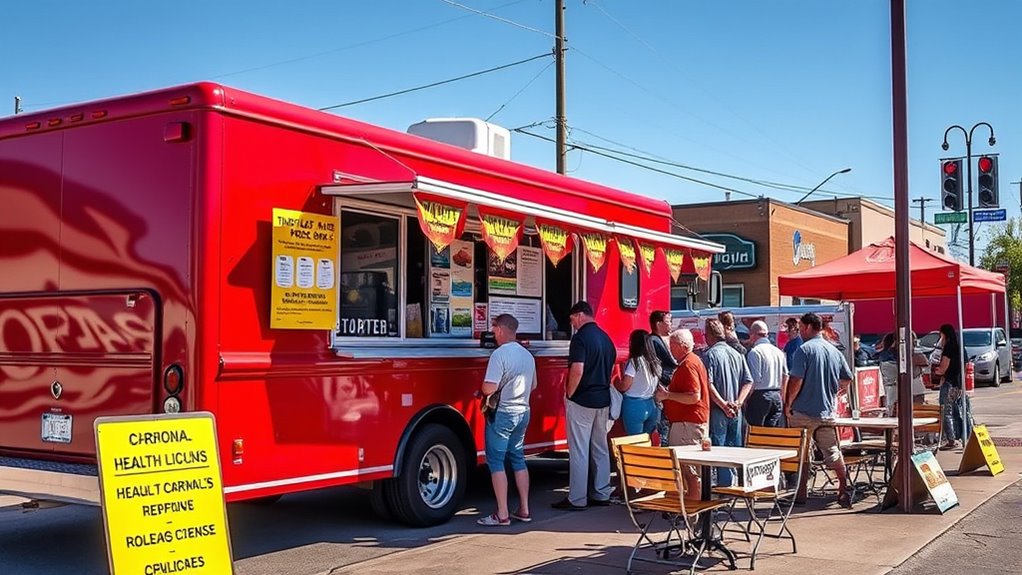
To operate your food truck in Tulsa, you’ll need to complete the online permit application process and submit all required sanitation documentation. You should also familiarize yourself with designated street parking zones to guarantee you’re parking legally. Understanding these local requirements helps you stay compliant and avoid costly penalties. Additionally, considering eye patch benefits can be part of your self-care routine to maintain a refreshed appearance during busy workdays.
Online Permit Application Process
Moving through Tulsa’s online permit application process is essential for getting your food truck up and running smoothly. It streamlines your approval, saving time and reducing hassle. To succeed, make sure you have all necessary documents ready, like proof of insurance and health certifications. The online portal guides you step-by-step, making it easy to submit your application. Be aware of specific local requirements that might affect your permit, such as zoning laws and vehicle regulations. Once approved, you can leverage digital marketing strategies to attract customers and boost engagement. Staying informed about the process helps you avoid delays and get your truck on the streets faster. Keep these tips in mind to navigate Tulsa’s system efficiently and set your food truck up for success.
Sanitation Protocols and Documentation
Understanding local sanitation requirements is essential for getting your food truck approved and operating smoothly in Tulsa. You must demonstrate proper handwashing procedures and maintain current sanitation certifications to meet health standards. Documentation should include proof of training and compliance with state and local regulations. Regularly check that your staff follow specific protocols, such as using designated sinks for handwashing and sanitizing surfaces properly. Keep records of cleaning schedules and certifications readily available in case inspectors request them. Here’s a quick overview:
| Requirement | Description | Responsible Party |
|---|---|---|
| Handwashing Procedures | Use designated sinks, wash for 20 seconds | All staff |
| Sanitation Certifications | Valid certificates for food handlers | Management |
| Recordkeeping | Maintain logs of sanitation activities | Owner/Manager |
| Inspection Readiness | Ensure documentation is accessible | Staff/Management |
Designated Street Parking Zones
Securing the right parking spots is a key step to launching your food truck operation in Tulsa. Understanding designated street parking zones guarantees you comply with local parking regulations and avoid fines. Tulsa has specific areas where food trucks are allowed to park, often marked by street signage. You’ll need to:
- Check for posted street signage indicating permitted parking zones
- Verify time restrictions and parking duration limits
- Understand any restrictions on street cleaning or special events
- Obtain necessary permits for designated zones
Familiarizing yourself with these rules helps you avoid violations and keeps your operation running smoothly. Always double-check signage and local ordinances before parking to stay compliant with Tulsa’s parking regulations and make the most of your food truck business.
Setting Up Your Base of Operations
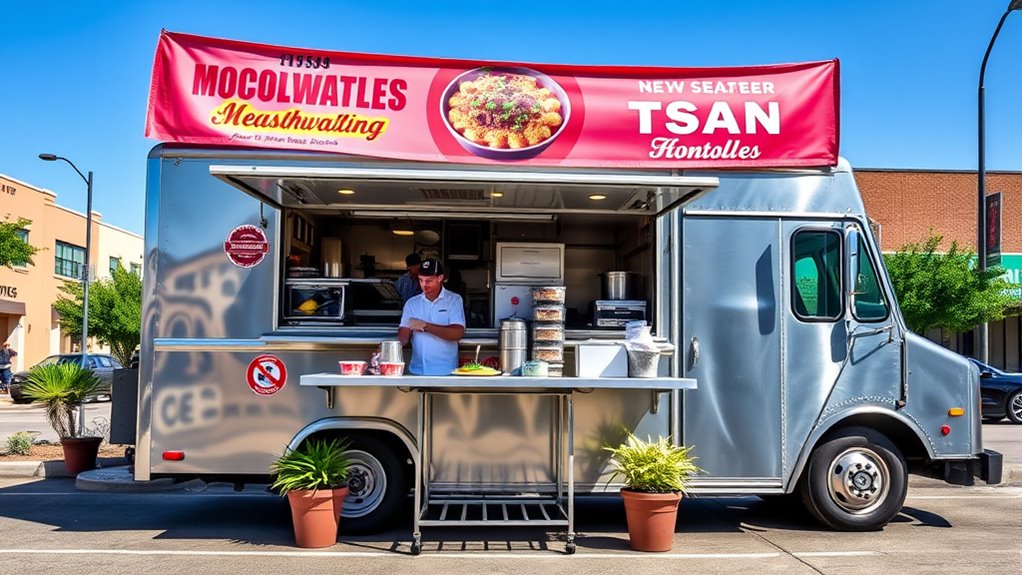
Choosing the right shared kitchen or licensing option can facilitate your setup process and reduce costs. You’ll also want to select custom kitchen equipment that fits your menu and space needs. Making these decisions early helps ensure your operations run smoothly from the start. Additionally, incorporating diverse and creative planters can enhance your food truck’s visual appeal and attract customers.
Shared Kitchen Licensing Options
Setting up your food truck’s base of operations often involves exploring shared kitchen licensing options, which can offer a flexible and cost-effective solution. Using a shared kitchen allows you to meet health regulations without the expense of building your own commercial space. These kitchens are equipped for food prep, licensing, and inspections, making compliance easier. Plus, they often provide a community of local food entrepreneurs for support and networking.
Here are some benefits of shared kitchen licensing options:
- Lower startup costs compared to building your own kitchen
- Flexible hours to suit your schedule
- Access to commercial-grade equipment
- Assistance with licensing and health permits
Choosing a shared kitchen can streamline your setup process and ensure you meet all necessary regulations efficiently.
Custom Kitchen Equipment Selection
Have you considered which custom kitchen equipment best suits your food truck’s menu and operations? Selecting the right equipment is essential for efficiency and quality. Focus on indispensable items like grills, fryers, and prep stations tailored to your cuisine. Proper equipment selection guarantees smooth workflow and compliance with health codes. To help, here’s a quick overview:
| Equipment Type | Purpose | Key Features |
|---|---|---|
| Commercial Oven | Baking, roasting | Compact size, temperature control |
| Food Prep Station | Ingredient prep | Ample workspace, storage |
| Refrigeration Units | Preserving ingredients | Energy-efficient, durable |
| Cooking Appliances | Main cooking methods | Versatile, reliable |
Choosing the right custom kitchen equipment streamlines your operations, saves time, and enhances customer satisfaction.
Budgeting and Financing Your Food Truck
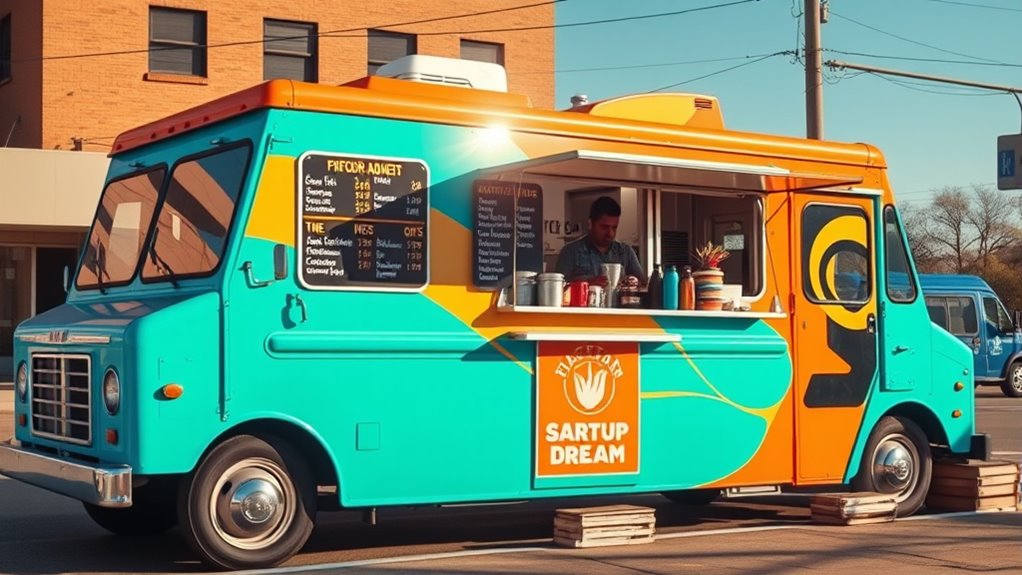
To get your food truck rolling, you need to plan for initial vehicle customization costs and find the right financing options. Local small business loans can help cover expenses and keep your budget on track. Don’t forget to include liability coverage to protect your investment as you start serving in Tulsa. Being aware of your toilet flushing mechanisms and potential costs can also help you manage your overall budget effectively.
Initial Vehicle Customization Expenses
Are you prepared for the initial vehicle customization expenses that come with launching a food truck? These costs can add up quickly, but they’re essential for creating a professional, eye-catching mobile eatery. Expect to invest in a high-quality vehicle wrap that showcases your brand and attracts customers from afar. Custom signage is also key for clear menu displays and branding. Other expenses include installing necessary kitchen equipment, safety features, and interior modifications. Here’s what to consider:
- Vehicle wrap design and application
- Custom signage for menus and branding
- Kitchen equipment installation
- Safety and regulatory modifications
Budgeting for these expenses ensures your truck not only looks great but operates efficiently and legally from day one.
Local Small Business Loans
Securing the right financing can make or break your food truck’s launch, especially after covering initial customization costs. Local small business loans are a common funding source for entrepreneurs like you. These loans often come with favorable terms and competitive interest rates, making them an attractive option. To access these funds, you’ll need to prepare a solid loan application that outlines your business plan, budget, and repayment strategy. Be sure to research local lenders, such as community banks or credit unions, which often have tailored programs for small businesses in Tulsa. Having a clear financial plan and demonstrating your ability to generate revenue will strengthen your loan application. Securing this funding is a vital step toward turning your food truck dream into a reality.
Liability Coverage for Food Trucks
Liability coverage is a crucial part of budgeting and financing your food truck, as it protects you from costly claims and legal issues that could threaten your business’s financial stability. Adequate insurance coverage ensures you’re covered if someone gets injured or if there’s property damage during operations. This liability protection helps you avoid devastating out-of-pocket expenses and legal disputes. When choosing your policy, consider these key points:
- Coverage limits suited to your business size
- Protection against food spoilage or equipment damage
- Inclusion of public liability insurance
- Customizable options for specific risks
Having solid liability coverage gives you peace of mind, allowing you to focus on serving great food while your insurance shields your finances from unexpected setbacks.
Designing Your Menu and Pricing Strategy
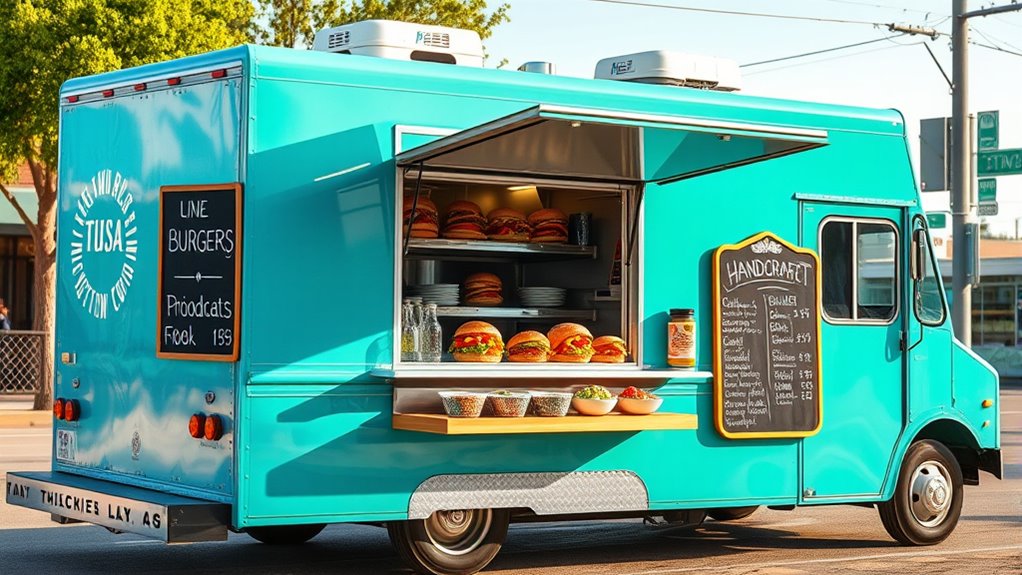
Your menu should showcase creative dish pairings that excite customers and keep them coming back. Implement dynamic pricing and upselling techniques to maximize profits without turning away budget-conscious diners. By balancing innovative options with smart pricing, you can attract a loyal and satisfied crowd. Incorporating aesthetic presentation in your dishes can further enhance the visual appeal and overall dining experience.
Creative Dish Pairing Strategies
Designing a menu with creative dish pairings starts by understanding how different flavors and textures complement each other, making your offerings more appealing and memorable. A well-executed flavor fusion can turn simple dishes into culinary experiences. To craft unique pairings, consider balancing spicy with sweet, crunchy with creamy, or savory with tangy. Think beyond traditional combos—try merging international ingredients for unexpected results.
Here are some ideas to spark your creativity:
- Spicy Cajun chicken with sweet pineapple salsa
- Crispy fish tacos with zesty lime aioli
- Juicy burger with a tangy mango chutney
- Vegan sliders with roasted red pepper hummus
These creative dish pairings will elevate your menu and attract diverse customers enthusiastic for innovative flavor experiences.
Dynamic Pricing and Upselling Techniques
Effective menu design and pricing strategies can substantially boost your food truck’s profitability by encouraging customers to try more items and spend more per visit. Price optimization is key—you want to set prices that reflect your costs while remaining attractive to customers. Use upselling techniques by suggesting add-ons or premium options, subtly guiding customers to higher-margin items. For example, recommend a drink pairing or a larger portion size at checkout. Keep your menu simple but strategic, highlighting popular or profitable items. Dynamic pricing can also help during peak hours or special events, adjusting prices slightly to maximize revenue. By combining thoughtful menu design with these upselling techniques, you create an engaging experience that boosts sales without overwhelming your customers.
Technology and Operations

Using wireless card readers and apps makes processing payments quick and easy for your customers. Real-time stock tracking software helps you stay on top of inventory without hassle. These tools streamline your operations, so you can focus on serving great food.
Wireless Card Readers and Apps
Wireless card readers and apps have revolutionized how food trucks like yours in Tulsa handle transactions. With mobile payments and contactless transactions, you can serve customers faster and more securely. These devices connect seamlessly to smartphones or tablets, eliminating the need for bulky cash registers. Not only do they streamline checkout, but they also reduce errors and improve customer experience. Plus, many come with integrated software to track sales and manage receipts effortlessly. You’ll benefit from increased efficiency during busy hours and the flexibility to accept a variety of payment methods. Whether customers pay with tap, swipe, or dip, your setup stays simple and reliable. Staying current with wireless payment technology guarantees your food truck remains competitive and ready for modern consumer preferences.
Real-Time Stock Tracking Software
Implementing real-time stock tracking software transforms how your Tulsa food truck manages inventory, ensuring you’re always aware of what’s on hand. With accurate inventory management, you can quickly identify low-stock items and reorder before running out, minimizing waste and maximizing profits. This technology also streamlines operations, reducing manual counting and errors. When your inventory is organized and up-to-date, you can focus more on customer engagement, providing faster service and better product availability. Real-time data allows you to adjust menu offerings based on stock levels, improving customer satisfaction. Overall, this software helps you run a more efficient, responsive food truck, giving you a competitive edge in Tulsa’s bustling mobile food scene.
Marketing and Growing Your Presence
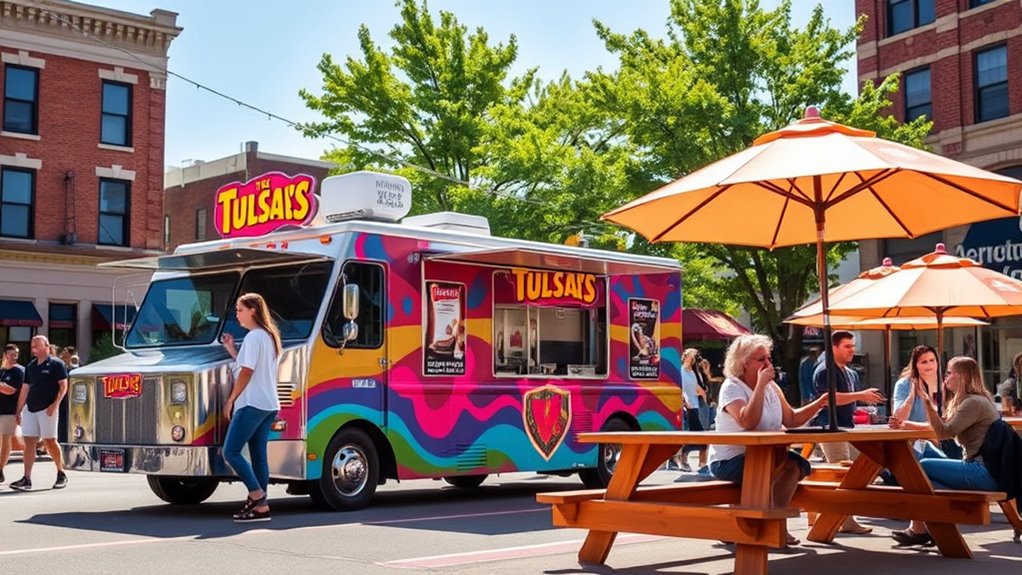
To grow your presence, focus on hitting popular event locations and prime times when foot traffic is high. Target local food festivals and community gatherings to attract new customers and build your reputation. These strategic choices can make a big difference in expanding your customer base quickly.
Popular Event Locations and Times
Wondering where to position your food truck for maximum visibility? Focus on popular event locations and prime times to boost customer engagement. Think about high-traffic spots like downtown festivals, farmers’ markets, and university events. Timing matters too; arrive early or stay late to catch different crowds. Your food truck design plays a role—make it eye-catching to stand out. Consider setting up near outdoor concert venues or sports events, where foot traffic surges. Also, coordinate with event organizers to secure spots that attract the right customers. By choosing the right locations and times, you’ll increase your chances of building a loyal following and growing your presence in Tulsa. These strategic moves are key to thriving in the vibrant food truck scene.
Targeting Local Food Festivals
Are you maximizing your food truck’s exposure by targeting local food festivals? These events attract large crowds enthusiastic to try new cuisines, making them perfect for growing your presence. To succeed, guarantee your food truck maintenance is premier to prevent breakdowns and maintain a positive reputation. Engage with customers and actively seek feedback; their insights can help you refine your menu and service. Participating in festivals also boosts brand visibility and creates opportunities for repeat customers. Be strategic about selecting festivals that align with your cuisine style and target audience. Remember, consistency in quality and service is key. By leveraging local food festivals effectively, you’ll build a loyal customer base and establish your food truck as a Tulsa favorite.
Tulsa Food Truck Community Support

The Tulsa food truck community thrives thanks to the strong support of locals and enthusiasts who regularly show up at events and share their enthusiasm. Your involvement fuels community collaboration, creating a network that benefits everyone. By engaging on social media outreach, you stay connected and promote local food trucks effectively. Supporting each other helps build a vibrant scene where new ideas flourish and trucks gain visibility.
You can:
- Attend community events and festivals regularly
- Use social media platforms to showcase your offerings
- Collaborate with other food truck owners for special events
- Encourage customers to share their experiences online
This active participation creates a sense of unity and helps sustain the local food truck movement, making Tulsa a go-to destination for food lovers. Your support truly makes a difference.
Frequently Asked Questions
What Permits Are Specifically Required for Food Trucks in Tulsa?
You need to obtain specific permits to operate your food truck in Tulsa. First, secure vehicle licensing to guarantee your truck meets local standards. Additionally, you must acquire food safety certifications to comply with health department regulations. These certifications verify you understand proper food handling, while vehicle licensing ensures your truck is roadworthy. Make sure to check with Tulsa’s city and state agencies for detailed requirements and to keep your business compliant.
How Do I Find the Best Locations to Park My Food Truck?
To find the best parking zones for your food truck, you should explore high foot traffic areas like busy downtown streets, event venues, and popular parks. Check local regulations and parking restrictions to guarantee legal parking. Visit different spots during peak hours to gauge foot traffic and customer flow. Connecting with local business owners and attending community events can also help you identify prime locations for attracting customers.
Are There Any Health Code Restrictions Unique to Tulsa?
Tulsa’s health code restrictions act like a vigilant lighthouse guiding your food truck’s journey. You must pass regular health inspections and follow strict food handling rules to stay afloat. Keep your food safe and your truck compliant, avoiding penalties that could sink your operation. Stay updated on local regulations, and prioritize cleanliness and proper food handling, ensuring your business shines brightly within Tulsa’s health standards.
What Are the Common Challenges Faced by New Food Truck Owners in Tulsa?
As a new food truck owner in Tulsa, you’ll face challenges like building strong food truck branding and establishing customer loyalty. Competition can be tough, so standing out requires creative marketing and quality food. Managing costs while maintaining consistency is vital. Additionally, steering through local health codes and finding prime locations may pose hurdles. Staying adaptable and engaging with your community will help you overcome these challenges and grow your business successfully.
How Can I Build Partnerships With Local Tulsa Businesses?
Did you know that 78% of successful food trucks partner with local businesses? To build partnerships in Tulsa, focus on community events where you can showcase your truck and connect with local businesses. Use cross-promotions like offering discounts or joint marketing efforts to attract more customers. Reach out directly, attend networking events, and demonstrate how your food truck can add value to their business, fostering mutually beneficial collaborations.
Conclusion
Starting a food truck in Tulsa transforms your passion into a thriving venture. By balancing bold branding, building your base, and mastering marketing, you’ll make your mark in the local food scene. Embrace the energetic excitement, engage with the enthusiastic community, and enjoy every flavorful step. With dedication and determination, your delicious dreams can develop into a dynamic, downtown destination. Immerse yourself, design, and deliver – your food truck adventure awaits!
